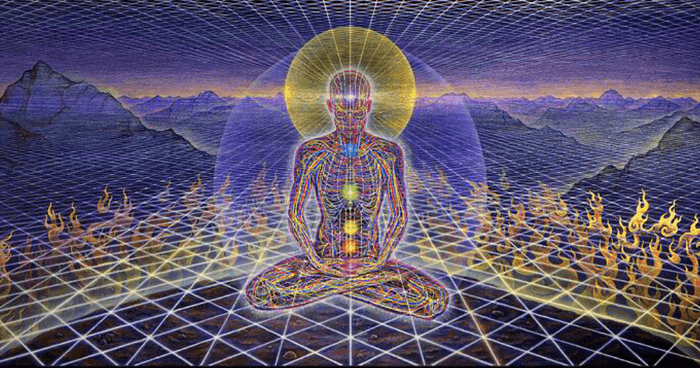Alex Grey: Tantra
Systasis: A setting together, a union.
This beautiful word was first posited by Jean Gebser: a philosopher, linguist and poet of the mid-20th century. Combining words such as system and stasis in what I see as an attempt to encourage a practice of integrating systems as opposed to creating new and better reductions of the whole they intend to model.
Gebser’s work reminds us how systems/maps, though valuable in helping a human mind digest a piece of a whole, are not the territory that they intend to help a person navigate. Ie.,
You might read a map to navigate a neighborhood but you can’t enjoy a cappuccino from your favorite coffee shop on Main Street simply by reading the map.
Earlier forms of society saw the ever changing whole and stood mystified by it. Speculating, perhaps with less of history to reference, but no less intelligent in the reasoning than I speculate to you in this moment.
From those early speculations systems arose and modern groups created systems of their own and in other cases evolved the old ones by using more precise measuring tools to understand and control the thing they were attempting to build a model of. Jean Gebser’s word “systasis” might remind you that “Yoga” in its pure sense simply translates to “Union”. “Yoga” as the tree that “hatha-yoga” is a branch existing upon, is a map intending to model a unified consciousness. When one starts breaking “yoga” into “hatha-yoga” and “karma-yoga” or “bhakti-yoga” we gain some focus that allows a person to trace the branch back to its trunk, but the “branch” in and of itself is not the “tree”.
There is a parallel confusion when one mistakes an individual “science” for the application of the scientific method. This goes to say: it may be better to employ the data of a given science to solve a related question or rather to engage with the scientific method to gain new insights to add to the pool of data. I may work with pranayama to improve my lungs and Dhyana the mind but the function of my lungs will always be intrinsically tied to my ability to focus and an inhibition to breathe may continually pull my focus back to the limits of the body, inviting me to explore Asana (posture and body mechanics)
It is important to know clearly what one’s goal “is” and if it has already been accomplished by another, to know which map the aspirant need follow.
Gebser’s intention with “systasis” was to remind us that we have enough maps. We need not build more, but rather recognize how to integrate more of our maps to understand more of the ever changing territory we wish to navigate. When viewed from the lense of a philosopher it is hard not to muse how this is related to the social/political sphere and the question of whether our “American” “goals” for progress such as “life, liberty and the pursuit of happiness” are still our goals and if the map we use to navigate civilization is bringing us (all of us) closer to those goals.
In mystical practices of fulfillment, an individual (or a group) must become clearer and clearer on the thing they “wish” for, while being very “scientific” in recognizing the ever changing territory that is one’s imagination (or a group’s mission) and the belief in what will bring satiety to desire.
In the process of “integrating” there is a quality of perspective drawn back into the abstract that exists in the sole pursuit of individualism. We are offered an opportunity to investigate how our rational exploration of the cosmos contributes to the whole of an organism, a species, a planet and the many other pieces that make up an expanding universe.
I’ve been informed by systems artistic, philosophical and kinesthetic that seek balance within one’s self and our relationship with the world. Social applications of this include my continued seeking for a less consumeristic approach to existence and the attempt to build relationships that seek autonomy and equality.
-
If you care to contribute to the comments section:
I am curious to know the maps you find relevant to solving what you believe are the most pressing concerns to humanity: be they artists models, intellectual, philosophical, or any other ways you make sense of your personal existence.
Cover Image: Alex Grey Theologue

